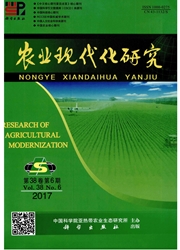

 中文摘要:
中文摘要:
城镇化必然造成部分农户与农村土地的分离。本文基于河北、山东和河南三省779户农户的调查数据,把农村土地退出分为政府主导、市场主导两大类7种方式,考察了农民承包地、宅基地的退出意愿,并运用mvprobit模型分析了影响农民土地退出意愿的因素及其作用方向。研究发现:家庭劳动供养率和人均收入的提高,会抑制农民用承包地换工资收入;有成员在城镇定居的农民更愿意转让承包地;教育程度和家庭规模对农民用宅基地换城镇房有正向影响;家庭规模较大、有成员在城镇定居的农民,更愿意用宅基地抵押贷款;年龄、劳动供养率、离农程度对农民的宅基地出售意愿有负向作用。为了引导农民退出土地,政府要完善农民退休和农村土地退出的顶层制度设计,为异质性农民退出土地提供灵活、多样的制度安排,加快推进土地的确权、登记、颁证工作,尤其是推进闲置宅基地以合适形式进行交易。
 英文摘要:
英文摘要:
The separation of farmers from their land is an inevitable result of urbanization. This paper,based on a survey of 779 rural households in Heibei,Shandong,and Henan,studies their wishes to withdraw their contracted land or homestead,and classifies them into 7 mode options of two types,namely,government- led and market- led,and analyzes the factors that may influence their options and the directional effects of the factors by using mvprobit model. The research shows that: The rise in household labor support rate and average per capita income may suppress their option to exchange their contracted land for income; those who have family members settled in cities or towns tend to transfer their contracted land; educational level and family scale have a positive impact on farmers' option to exchange their rural homestead for houses in cities or towns; larger families or families that have members settled in cities are more likely to opt to mortgage their homestead for loans; and age,labor support rate and extent of separation from agriculture and rural area have a negative impact on farmers' option to sell their homestead. To lead farmers to opt out of their contracts,government should improve top- down design of the pension system for farmers and the rural land withdrawal system,and offer flexible policy options for heterogeneous farmers after they opt out of the contract,and push ahead with the work to determine,register and certify contracted land- use rights,and in particular guide the orderly transfer of idle land for housing.
 同期刊论文项目
同期刊论文项目
 同项目期刊论文
同项目期刊论文
 期刊信息
期刊信息
